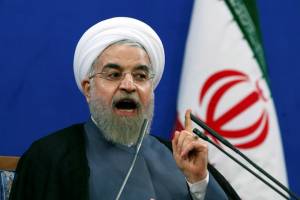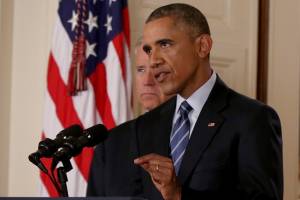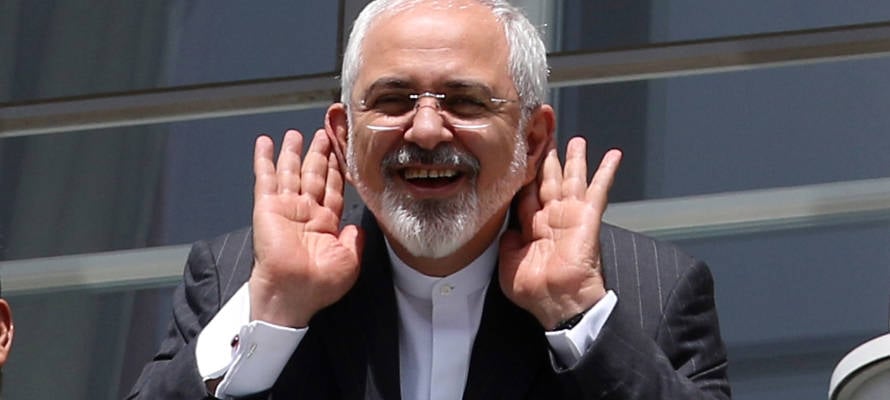The reality is that there were always alternatives, though they became less realistic as the negotiations progressed. We could have stuck to the original red lines.
The most compelling argument the Obama administration is offering to boost what it acknowledges is a compromise nuclear deal with Iran is this: it’s better than the alternatives. That sort of pragmatic point is appealing to members of Congress, particularly skeptical Democrats who are searching for ways to support their president and who are accustomed to voting for the lesser of evils in a realpolitik world where the options are often bad, worse, even worse, and worst of all.
But the question remains: How did we get ourselves into the situation where there are no good options?
We did so by beginning the negotiations with three important concessions. First, we took the military option off the table by publicly declaring that we were not militarily capable of permanently ending Iran’s nuclear weapons program. Second, we took the current tough sanctions regimen off the table by acknowledging that if we did not accept a deal, many of our most important partners would begin to reduce or even eliminate sanctions. Third, and most important, we took off the table the option of rejecting the deal by publicly acknowledging that if we do so, we will be worse off than if we accept even a questionable deal. Yes, the president said he would not accept a “bad” deal, but by repeatedly watering down the definition of a bad deal, and by repeatedly stating that the alternative to a deal would be disastrous, he led the Iranians to conclude we needed the deal more than they did.

Iranian President Hassan Rouhani calls for death to America and Israel. (AP/Ebrahim Noroozi)
These three concessions left our negotiators with little leverage and provided their Iranian counterparts with every incentive to demand more compromises from us. The result is that we pinned ourselves into a corner. As Danielle Pletka of the American Enterprise Institute put it: “The deal itself became more important than what was in it.” President Obama seems to have confirmed that assessment when he said: “Put simply, no deal means a greater chance of more war in the Middle East.”
Only time will tell whether this deal decreases or increases the likelihood of more war. But one thing is clear: By conveying those stark alternatives to Iranian negotiators, we weakened our bargaining position.
The reality is that there were always alternatives, though they became less realistic as the negotiations progressed. We could have stuck to the original red lines – non-negotiable demands – from the beginning. These included on-the-spot inspections of all facilities rather than the nearly month-long notice that will allow the Iranians to hide what they are doing; shutting down all facilities specifically designed for nuclear weapons production; maintaining the embargo on missiles and other sophisticated weapons rather than allowing it to gradually be lifted; and most crucially, a written assurance that the international community will never allow Iran to develop a nuclear arsenal. The current assortment of indeterminate and varying timelines agreed to will allow Iranians to believe – and proclaim – they will soon be free of any constraints on their nuclear adventurism.
Desperate for a Deal to Enhance Obama’s Legacy
Instead, we caved early and often because the Iranians knew we desperately need a deal to implement President Obama’s world vision and to enhance his legacy.

US President Barack Obama. (AP/Andrew Harnik)
This approach to the deal – surrendering leverage from the outset – violated the most basic principles of negotiation 101. We were playing checkers against the people who invented chess, and their ayatollah checkmated our president.
But the real losers were those countries — our allies — who were not even allowed to participate in the negotiations. Virtually every Middle Eastern leader, with the exception of Syria’s Assad, opposes this deal. Nor do they feel bound by it, since they did not have a vote. The deal was imposed on them, in much the same way the Chamberlain-Hitler deal was imposed on Czechoslovakia in 1938. The difference is that Czechoslovakia did not have the means to defend itself, whereas Israel and some of its Sunni neighbors do have the capacity to try to prevent Iran from developing a nuclear arsenal — which the mullahs would use to increase their hegemony over the area and to threaten Israel’s security through its surrogates, Hezbollah and Hamas. Those groups would become even more aggressive under the protection of an Iranian nuclear umbrella.
The end result of this porous agreement may well be, to turn President Obama’s words against his own conclusion: “A greater chance of more war in the Middle East.”
Churchill correctly predicted that the Chamberlain deal with Hitler would bring war. Let’s hope the Iran deal – based on deeply flawed negotiations – will not produce a similar catastrophe.
By Alan M. Dershowitz, professor emeritus at Harvard Law School and prominent author and political commentator.
This article was originally published in the Boston Globe and Gatestone Institute.


